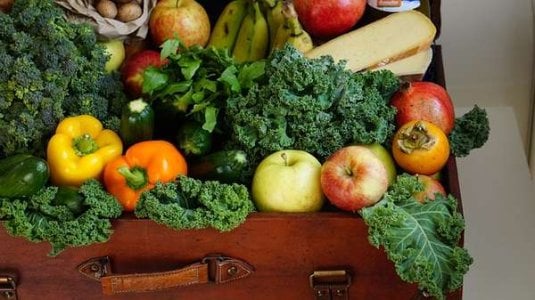Struggling Single Mum & ALDI Employee Shares the Truth About Food Wastage in Supermarkets
At the Seniors Discount Club, we understand the importance of being mindful of waste and the pressure your weekly grocery shop has on your budget.
That's why the story of a Sydney-based single mother employed at an ALDI supermarket has struck a chord with us.
In a heart-wrenching confession, the employee, who wishes to remain anonymous (we'll refer to her as 'Grace'), revealed the shocking amount of food wasted each day at ALDI, all while she struggles to provide for her own family.
Like other major supermarket chains in Australia, ALDI has committed to achieving 'zero food waste sent to landfill' by 2023 and 'zero waste overall to landfill' by 2025.
They have implemented various waste reduction initiatives, such as donating edible food to food rescue organisations and repurposing food unfit for human consumption as animal feed.
However, Grace's experience tells a different story. She shared that the wastage occurring at the store where she works in Southwest Sydney is 'absolutely shocking', and as a working mother herself, Grace is appalled by the blatant disregard for the value of this food.
While ALDI does work with food rescue organisations like OzHarvest, and several local farms receive food waste for animal feed, Grace claims that the majority of the edible food gets discarded.
She stated, 'The farmers pick up our wastage, but they’re only really picking up produce to feed the animals, they’re not picking up meat, eggs, Christmas or Easter decorations; it’s all just going to the bin.'
Grace has even resorted to going through the rubbish to provide meals for her family, receiving assistance from a kind-hearted Good Samaritan named Michael.

Through connections made on a local Facebook community group, Grace has managed to save hundreds of dollars on her grocery bill each month—no small feat when wrangling high rent and the expenses of raising two children.
Yet, the disturbing reality remains that masses of perfectly good food are being thrown away. Grace wonders why this food can't be made available to those who need it, and she suggests easing penalties for people who go through rubbish, otherwise known as ‘dumpster divers’, and even leaving supermarket bins unlocked.
She asks, 'The charities aren’t taking it, the farmers aren’t taking it, so why can’t it go to the people?'
 In response to Grace's story, ALDI issued a statement reiterating its commitment to achieving zero waste and food waste goals.
In response to Grace's story, ALDI issued a statement reiterating its commitment to achieving zero waste and food waste goals.
However, Grace remains sceptical and urges supermarkets to take a closer look at their practices and find better ways to support those who are struggling rather than sending good food to landfill.
Remember, food wastage isn't just an issue in supermarkets; it starts in our homes. By making a conscious effort to plan our meals, shop smarter, and make full use of leftovers, we can all do our part to reduce waste and ensure everyone has enough to eat.
What are your thoughts on food wastage in supermarkets, and what tips or experiences can you share about reducing waste and supporting those in need? Let's discuss in the comments below and learn from each other's thoughts and opinions!
That's why the story of a Sydney-based single mother employed at an ALDI supermarket has struck a chord with us.
In a heart-wrenching confession, the employee, who wishes to remain anonymous (we'll refer to her as 'Grace'), revealed the shocking amount of food wasted each day at ALDI, all while she struggles to provide for her own family.
Like other major supermarket chains in Australia, ALDI has committed to achieving 'zero food waste sent to landfill' by 2023 and 'zero waste overall to landfill' by 2025.
They have implemented various waste reduction initiatives, such as donating edible food to food rescue organisations and repurposing food unfit for human consumption as animal feed.
However, Grace's experience tells a different story. She shared that the wastage occurring at the store where she works in Southwest Sydney is 'absolutely shocking', and as a working mother herself, Grace is appalled by the blatant disregard for the value of this food.
While ALDI does work with food rescue organisations like OzHarvest, and several local farms receive food waste for animal feed, Grace claims that the majority of the edible food gets discarded.
She stated, 'The farmers pick up our wastage, but they’re only really picking up produce to feed the animals, they’re not picking up meat, eggs, Christmas or Easter decorations; it’s all just going to the bin.'
Grace has even resorted to going through the rubbish to provide meals for her family, receiving assistance from a kind-hearted Good Samaritan named Michael.

According to Grace, charities are expected to accept the produce, but it depends on whether they have already gathered enough supplies from other supermarkets such as Coles or Woolworths. Image by Pixabay
Through connections made on a local Facebook community group, Grace has managed to save hundreds of dollars on her grocery bill each month—no small feat when wrangling high rent and the expenses of raising two children.
Yet, the disturbing reality remains that masses of perfectly good food are being thrown away. Grace wonders why this food can't be made available to those who need it, and she suggests easing penalties for people who go through rubbish, otherwise known as ‘dumpster divers’, and even leaving supermarket bins unlocked.
She asks, 'The charities aren’t taking it, the farmers aren’t taking it, so why can’t it go to the people?'
Key Takeaways
- An ALDI worker has exposed the shocking amount of food wastage occurring at her Southwest Sydney store each day while she struggles to feed her own family.
- She claims that waste reduction initiatives mentioned on ALDI's website, such as donating edible food and sending non-edible food for animal feed, are not being followed adequately.
- The worker says strict guidelines of food rescue organisations like OzHarvest contribute to a small portion of food being collected, leaving most of it wasted.
- ALDI claims that they are 'committed to achieving zero waste' sent to landfill by the end of 2025 and are working with food rescue partners, OzHarvest, and Foodbank to redistribute edible surplus food.
However, Grace remains sceptical and urges supermarkets to take a closer look at their practices and find better ways to support those who are struggling rather than sending good food to landfill.
Remember, food wastage isn't just an issue in supermarkets; it starts in our homes. By making a conscious effort to plan our meals, shop smarter, and make full use of leftovers, we can all do our part to reduce waste and ensure everyone has enough to eat.
What are your thoughts on food wastage in supermarkets, and what tips or experiences can you share about reducing waste and supporting those in need? Let's discuss in the comments below and learn from each other's thoughts and opinions!








